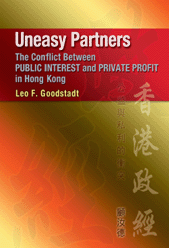Meeting the Author Night
Uneasy Partners: The Conflict Between Public Interest and Private Profit in Hong Kong / Leo F. Goodstadt
Speaker: Leo F. Goodstadt
Moderator: Christine Loh
Date: 23 February 2006 (Thursday)
Time: 7:15 - 9:00 pm
Venue: Special Collections, 1/F, Main Library, The University of Hong Kong
Language: English
About the Book
 Uneasy Partners: The Conflict Between Public Interest and Private Profit in Hong Kong
Uneasy Partners: The Conflict Between Public Interest and Private Profit in Hong Kong
In Uneasy Partners, Leo Goodstadt draws on his vast experience of government and business in Hong Kong to put forward a provocative and challenging account, part praise, part indictment, of how government and business in Hong Kong transformed a poor refugee community into one of the world’s great cities and created a hugely successful economy.
The core of the book is a penetrating appraisal of the often paradoxical partnership between government and business and its considerable political and social costs. The principal actors in the story are the colonial rulers who were prepared to sacrifice Britain’s diplomatic interests and the interests of British companies in order to ensure Hong Kong’s survival, and their chosen allies from the Chinese business elite.
British officials believed that economic growth and the survival of colonial rule depended on collaboration with Chinese capitalism and cooperation with China’s communist rulers. The book identifies how the community set limits to these relationships, preventing the blatant sell-out of the public’s wellbeing to British, Mainland or local business interests. It reviews how colonial officials defied London’s proposals for political and social reform, fought for economic and financial autonomy and refused to protect the pound sterling. It identifies Beijing’s financial gains from the colonial policies that provided China with a secure international business base throughout the Cold War. Other chapters assess the belated drive against wholesale corruption, the decline of British commercial conglomerates, the ascendancy of HSBC, and the contribution of businessmen from Shanghai.
The story goes on beyond the British departure and explains how the Chinese Government’s decision to retain the political system of the colonial era handicapped the new leadership in responding to the changing political and social expectations of the community.
About the Speakers
Leo F. Goodstadt brings to this book personal experience of policy making at the highest levels and extensive access to decision-makers and business leaders since 1962. As Head of the Central Policy Unit, he was chief policy adviser to the Hong Kong Government from 1989 to 1997 and involved in a wide range of major reforms including elections, welfare, administrative efficiency and budgetary policies. He has had a successful career as a consultant economist to leading business corporations both before and since his government service. He became well-known for his incisive reporting on Hong Kong and China as Deputy Editor of the Far Eastern Economic Review and Hong Kong correspondent for Euromoney. His academic research has been widely published. He is now an adjunct professor in the School of Business Studies, Trinity College, University of Dublin and an honorary fellow of the University of Hong Kong.

